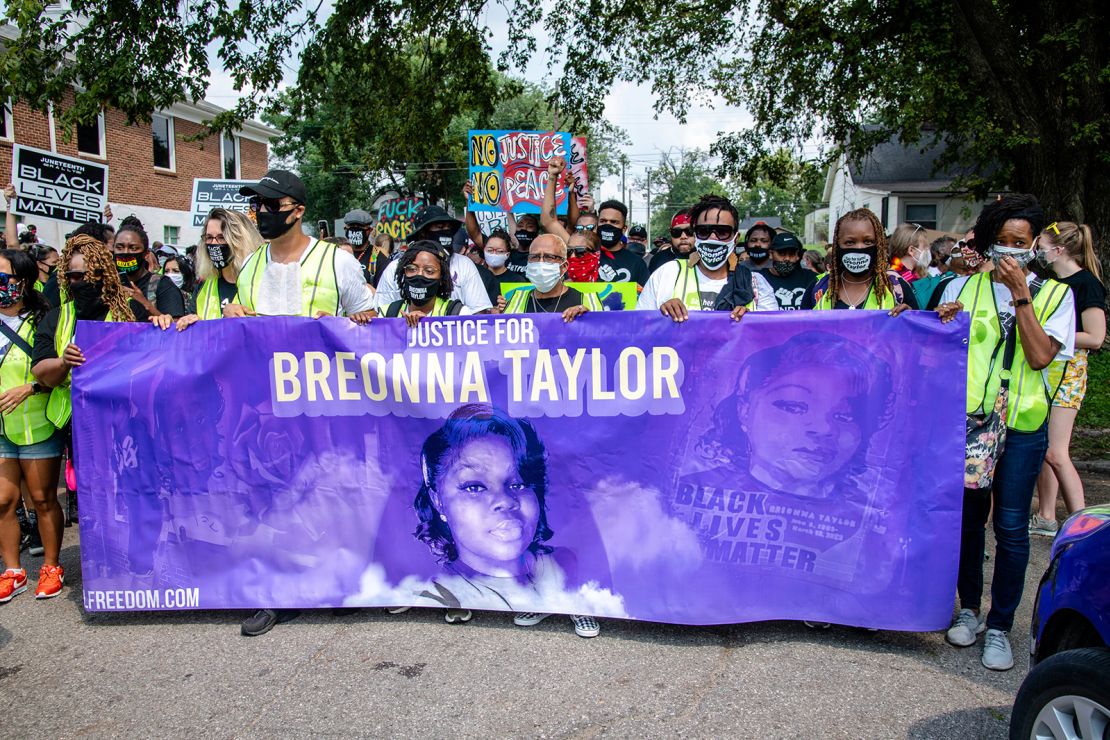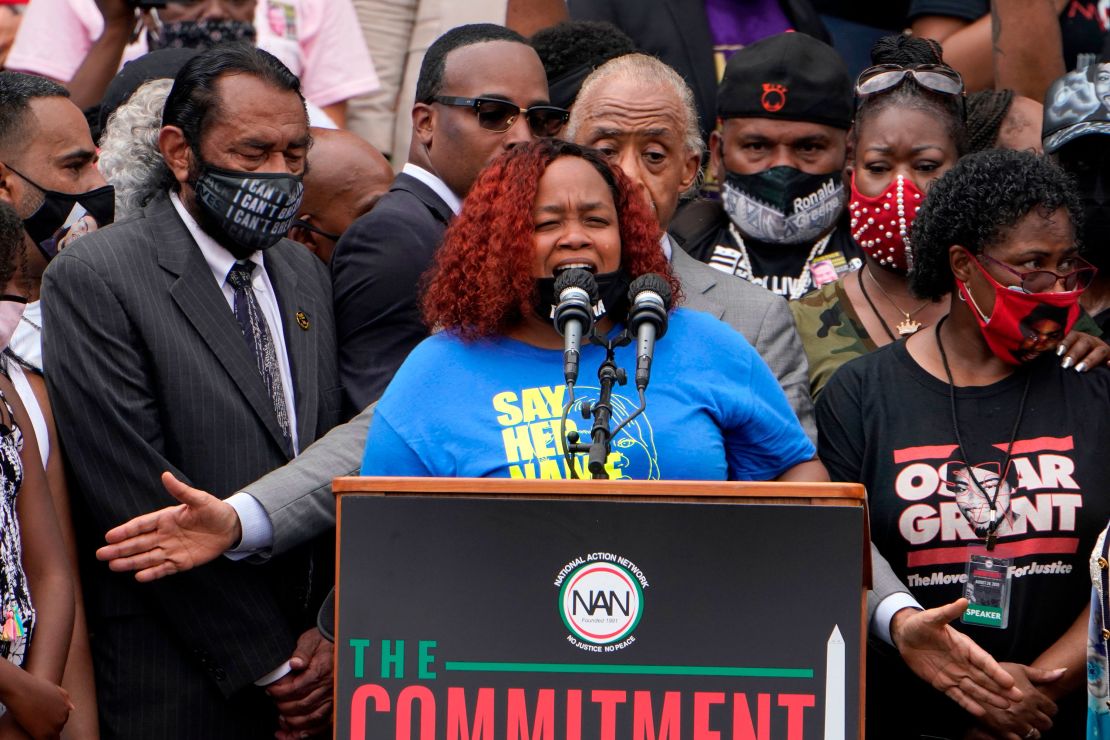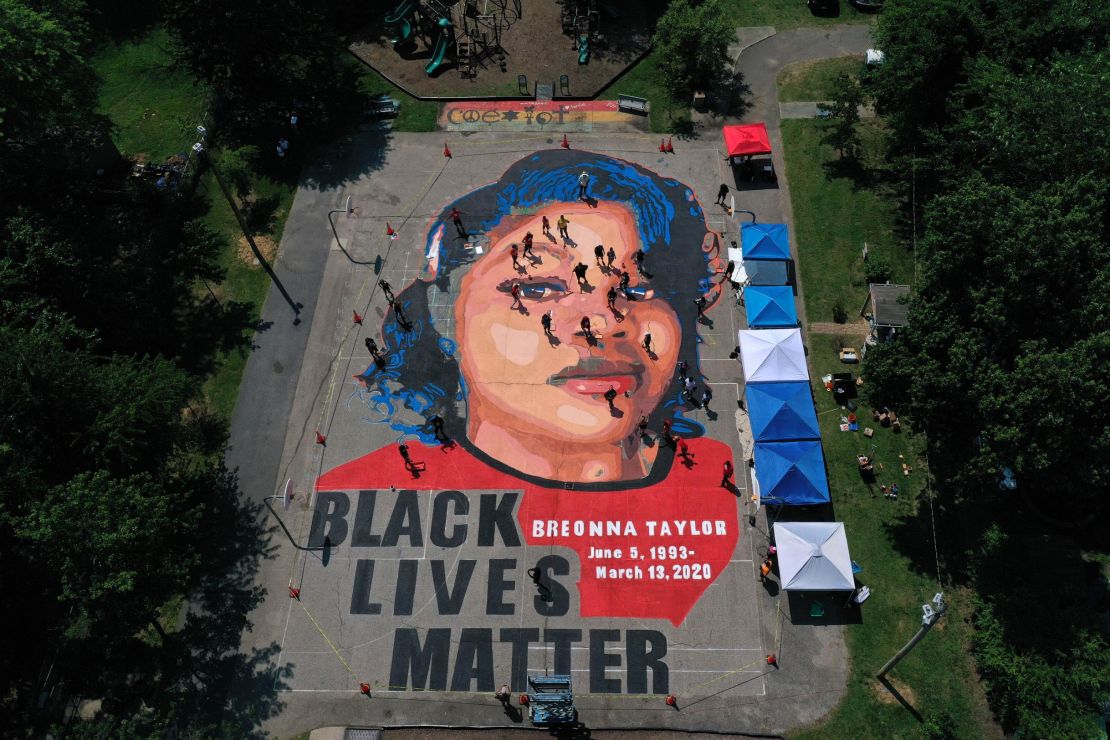Before her face graced magazine covers, before protesters chanted her name, before she became a rallying cry in the fight against racial injustice and police brutality, Breonna Taylor was a 26-year-old with big dreams.
She’d worked at a Steak & Shake. She’d held a job driving senior citizens to their appointments. Now she was living her passion as an ER medical technician.
Her next goal was to become a nurse – and her family believed she could. They’d affectionately nicknamed her “Breewayy” – because whatever she wanted, she found a way to make it happen.
Her personal life was thriving, too. Her boyfriend had an engagement ring and was ready to propose and start a family. Taylor wanted a baby girl and had already picked out a name, her sister, Ju’Niyah Palmer said.
But those plans died with her on March 13, 2020, when three Louisville officers burst into her apartment after midnight with a no-knock warrant. Taylor had drifted off to sleep after watching a movie in bed with her boyfriend, Kenneth Walker. The officers banged on the green door with a gold No. 4 on it, then used a battering ram to break it down.
Fearing an intruder, Walker opened fire. The officers responded by unleashing a barrage of bullets. Walker was unharmed, but Taylor, following him down the hallway toward the front door, was struck multiple times.
Almost two years later, the only criminal trial linked to the botched police raid is finally about to start.
Brett Hankison is the only one of the three officers facing criminal charges. He’s accused of three counts of felony wanton endangerment for blindly firing 10 shots into Taylor’s apartment, and has pleaded not guilty.

Taylor loved muscle cars and her mom’s chili
Breonna Taylor’s family describes her as the glue that held them together.
Her mother, Tamika Palmer, was so devastated at the loss of her first born that she spent Mother’s Day 2020 in bed.
Taylor would have marked her 27th birthday that Junewith a dinner at a fancy restaurant, her mother says. She loved family gatherings, and would have insisted everyone get dressed up that day.
In a Vanity Fair article, Palmer recounted how she got pregnant with Taylor while she was a teen and was terrified her daughter would make the same mistakes.
But Taylor was a high achiever and goal-oriented. She started walking at 9 months, got her first computer at age 7 and loved listening to Johnnie Taylor’s blues as a little girl.
Mother and daughter grew up together, building a close relationship filled with funny anecdotes. Palmer recalled her daughter’s numerous morning calls asking for her chili recipe after her overnight shift at the hospital.
“Breonna would be in the grocery store at 7 in the morning … calling me like, ‘Mama, what do I need to buy for chili?’” she wrote. “And I would say, ‘Breonna, can you write this down, because I don’t understand why I got to tell you this all the time.’”
The mother and daughter also shared a passion for muscle carsand motorcycles. Taylor had just bought her dream car shortly before she died.
“Breonna’s absolute favorite was the Dodge Charger. She was on her second one — a 2019 Dodge Charger R/T,” her mother wrote. “She was so proud of this car, it was her baby. And she got these pipes on it. It’s got dual exhaust so you get the vroom!”

Her death prompted widespread calls for justice
Taylor’s death has resonated far beyond Louisville.
For months, protesters took to the streets nationwide demanding justice. None of the officers involved in the raid have faced charges for Taylor’s actual killing. The other two officers, who also fired shots during the raid, were not indicted.
Even so, Taylor’s case has brought some changes in policing. In June 2020 Louisville passed “Breonna’s Law,” an ordinance banning no-knock search warrants. The law also requires officers serving search warrants in the city to wear body cameras.
None of the three plainclothes officers who entered Taylor’s apartment that night wore body cameras, the department said.
Celebrities such as pop star Beyonce and NBA player LeBron James joined the call for justice for Taylor. Oprah Winfrey put her on the cover of her magazine and set up billboards with her image across Louisville.
Taylor is sometimes mentioned in the same breath as George Floyd, who died two months later in Minneapolis, as high-profile examples of Black people suffering at the hands of police. Derek Chauvin, the Minneapolis officer who knelt on Floyd’s neck for more than nine minutes, was convicted last April of murder and sentenced to more than 22 years in prison.
Taylor’s death is a reminder that Black women also face brutality at the hands of law enforcement and that those intersections of race and gender must be acknowledged, says David Stamps, an assistant professor at Louisiana State University.
“Breonna Taylor, like Sandra Bland and other Black women, are often relegated to the back row as the emphasis is typically placed on the systemic racism and brutality that Black men face,” Stamps said.
“This is why Breonna Taylor is an icon. She reminds us that we need to #SayHerName and that all Black life matters.”

A previous relationship led police to Taylor’s door
Her aunt, Bianca Austin, described Taylor as a “spunky, goofy little kid” who blossomed into a hard-working young woman who placed an emphasis on family.
But Taylor’s path to happiness was not always smooth. It included a previous relationship with Jamarcus Glover, an alleged crack cocaine dealer. He was the reason police went to her door that night.
A judge had approved five no-knock search warrants the day before Taylor was killed, court records show. They were for locations linked to Glover, a convicted felon suspected of supplying a local drug house.
One of those places was Taylor’s apartment, where Glover had been receiving mail, according to an affidavit for a search warrant. The affidavit did not document any activity regarding Taylor or her residence in March.
Attorneys for Taylor’s family have said the police information was wrong and outdated. Any mail Glover may have received at her apartment would have been innocuous items such as clothes or shoes, they said.
Her family has said she had dated Glover but wasn’t involved in the alleged drug operation because Taylor had prohibited him from bringing that aspect of his life into her personal life.
When police banged on the door that night, Walker told investigators his first thought was that it was Glover. He said Taylor had dated Glover during their on-and-off seven-year relationship, and he was concerned there might be trouble.
So Walker grabbed a gun that he legally owns, his attorney said. By the time the police gunfire subsided, Taylor lay beside him in the hallway, bleeding profusely. There were bullet holes everywhere.
Police found no drugs or money in Taylor’s apartment.
The road to justicefor Breonna Taylor has been long and complicated, her family says.
The city of Louisville agreed in September 2020 to pay $12 million to Taylor’s family to settle a wrongful death lawsuit. The officer who fired the shot that killed Taylor was fired by the city in January 2021.
The criminal trial starting this week is the next step.
CNN’s Scott Glover, Collette Richards, Curt Devine and Drew Griffin contributed to this report

